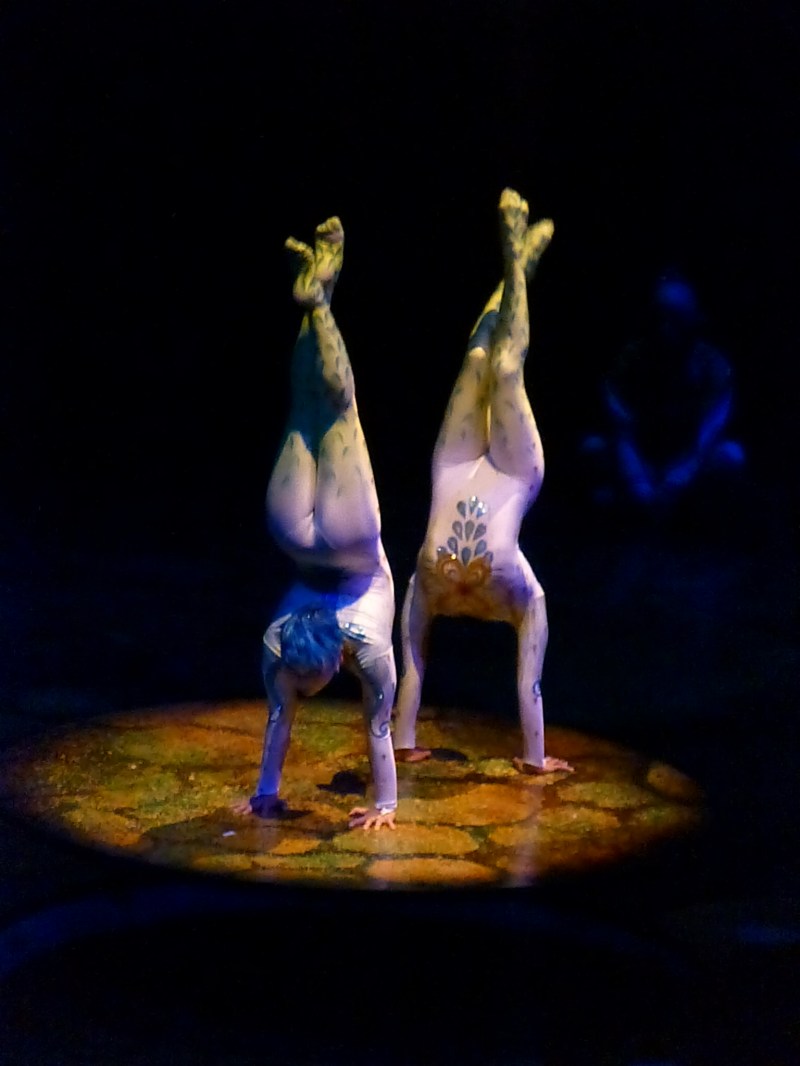Maika Isogawa does not waste time or words, direct and articulate from the moment she arrives at my door. Her smiles are sharp and quick, she carries herself with the easy assurance of an athlete, and she looks at things like she’s already categorized everything she’s ever seen.
Unlike most of us, who haven’t yet spent years working in the “real” world, Maika is back at Stanford after having spent two years touring as an aerialist with Cirque du Soleil and Spiegelworld.
Born in Tokyo to a Japanese father and an American mother, Maika spent the first five years of her life in Japan before moving to Minnesota. Every summer until she was around 11, she spent the three-month-long American summer break attending school in Japan.
“It was overall positive,” she says. “Because I was a foreigner, I was very popular, and as kids we weren’t at that age where people get judgmental and have these strange rifts.”
One day her mom took her to see the circus school for kids that a friend’s child was taking lessons at. “I didn’t want to go at all, I had to basically be dragged into the building,” Maika says. “But then, for an active kid, you see the ropes hanging from the ceiling and trampolines on the back wall, kids tumbling on the floor …it’s a dream playground.”
Soon, instead of swimming or horseback riding, circus became Maika’s extracurricular. Youth circus schools are rare in the States, but the one she attended in Minnesota was the biggest one in the country. As her skill level rose and she needed additional training to develop basic strength and flexibility for more advanced tricks, class jumped to five hours a day, five days a week.
She was a freshman at Stanford when Spiegelworld, the live entertainment production company, offered her a spot as a performer midway through fall quarter. Maika had always wanted to try performing professionally even though it wasn’t her dream, but she’d also made great friends in her dorm. However, she reasoned that she’d never be in as great a shape again, was a year younger than most of her peers anyways and would otherwise be missing an opportunity she’d been setting herself up for for years.
Despite her dad’s worries — “from a young age I haven’t allowed my parents to be involved in my life decisions except to support me” — Maika accepted, soon finding herself housed in Las Vegas two blocks off of the Strip for training. During the day she would walk to the tent and train with the couple whose Duo Straps act she and her partner were copying, getting the occasional pointer from the artistic coach. Off-site, she would go to the gym for core conditioning.
Then it was off to Australia for the “Absinthe” tour. Later that same year, through a series of fortunate events, both Maika and her partner received offers to work for Cirque du Soleil. This time, it was off to train in Canada.
“Montreal in the middle of winter was horrible! So cold,” she remembers. Again, there was artistic and acrobatic training during the day, cardio and flexibility on Maika’s own time afterwards. “It was working out the entire day,” she says wryly.
Once she’d learned everything, right down to how to do her own makeup, Maika and her partner were flown to the main show location to begin practicing on stage and learning their cues. By the end of the month they’d had their first performance and were fully integrated into the show.
“In the beginning you’re in awe with the treatment,” Maika admits. “They take care of everything: your visa, paperwork, housing, taxes for the countries you’re not a citizen of. As a performer, they treat you so well. Onsite we have physiotherapists, massages once a week. We travel with chefs who create beautiful food all the time…”
And in between cities — Brussels, Sochi, Tokyo — performers had two weeks to explore and travel on their own while the performance arenas were set up.
But, as with most jobs, there were downsides. Physical fitness had to be maintained at all times, which included constantly evaluating what was being eaten when.
“I was performing in a bikini, so if I was going to eat something that made me bloated, I couldn’t do that before the show,” Maika says. “It was kind of a drain on daily things. I ended up really being a stickler for sleep. Sometimes I’d have an injury and still feel like I needed to perform.”
Maika knows she could have continued performing for at least 20 more years so long as she didn’t get injured. “But I had way too many interests to stay,” she explains. “I was the lead in a Cirque show by eighteen. Where else [was I] going to go along that route?”
To her, it all feels like a whole different lifetime ago. Now, odd as it is, Maika’s back in the same boat as all of us students are, wondering what she’ll be doing in the future, grinding through the internship application process.
She’s living in a commune at Columbae, a far cry from the luxurious one-person apartments or hotel rooms from her touring days. She has also joined Stanford’s ultimate Frisbee team, which gives her what she needs in terms of physical and competitive fulfillment, and is a Symsys major because it has so much breadth and flexibility.
“There are so many opportunities that are open to exploration,” she says. Maika’s done the world-class performer thing. Now on to the next enterprise.
Contact Katiana Uyemura at kuyemura ‘at’ stanford.edu.
